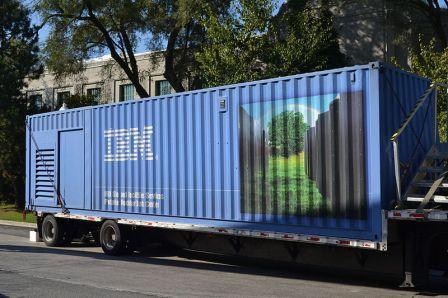In a recent exchange on LinkedIn’s popular DatacenterDynamics Global Discussion forum, a well-publicized and storm-related power outage (which caused major downtime at a primary Amazon Cloud data center in the U.S. Northeast) prompted an intriguing question: “Is it time for more off-grid options for data centers?”
Worldwide comments ranged from the pragmatic (“having off-grid capabilities is an interesting academic argument, but the majority of operators simply do not (and cannot) have this option available”), quizzical (“are we talking on-site [power] generation or green energy source?”) to prognostic (“perhaps the future is not monolithic energy-hungry data centers at all, perhaps the future is smaller modules, powered by renewable energy from local communities…”).
While it’s not surprising to see differing opinions towards a relatively new development in the marketplace, the varied response to modular data centers does invite deeper examination:
– by definition, a modular data center is a portable method of deploying data center capacity, anywhere that capacity is needed.
– not all modular data centers are created equal. While some mimic the containerized style of a semi-truck tractor trailer (see image below), newer styles are beginning to push the envelope on small-sized mobility, while others still are re-writing the book on where these units reside (some as stand-alone, “off the grid” type deployments, others more at home under the roof of a traditional, warehouse style installation) – while some of the first modular data centers were developed by the likes of HP, IBM and Cisco for flexible alternatives to mega-scale infrastructures, mid- to small-level companies are generating new demand in modular offerings (some even built around colocation platforms) that offer traditional support at fractions of the traditional cost. Furthermore, the notion of ‘traditional’ support is itself being revolutionized by the ability to deploy modular units in remote and mission critical physical spaces (think sporting events, war zones).
– while some of the first modular data centers were developed by the likes of HP, IBM and Cisco for flexible alternatives to mega-scale infrastructures, mid- to small-level companies are generating new demand in modular offerings (some even built around colocation platforms) that offer traditional support at fractions of the traditional cost. Furthermore, the notion of ‘traditional’ support is itself being revolutionized by the ability to deploy modular units in remote and mission critical physical spaces (think sporting events, war zones).
– while traditional data center build times factor in multiple deadlines and construction phases, modular offerings are typically ready to deploy on day one. In this fashion, a stand-alone unit simply requires the proper power and network hook-ups necessary for "plug and play" type convenience.
Join us tomorrow for part two of our three-part modular series. We'll be exploring the challenges of maintaining uptime in increasingly complex infrastructures and how data center mobility seeks to alleviate the dilemma. Jeff Cihocki, Global eContent Specialist